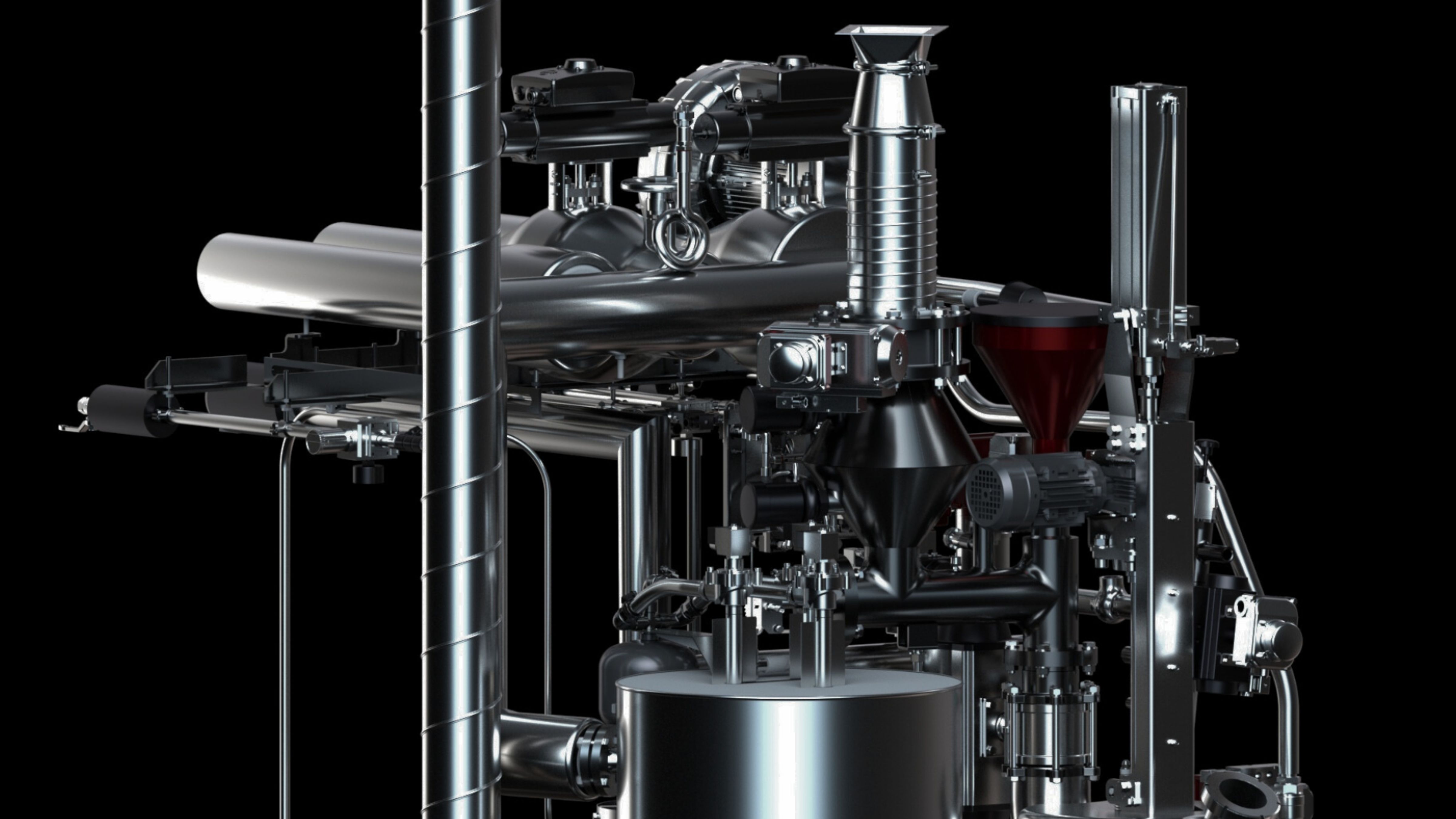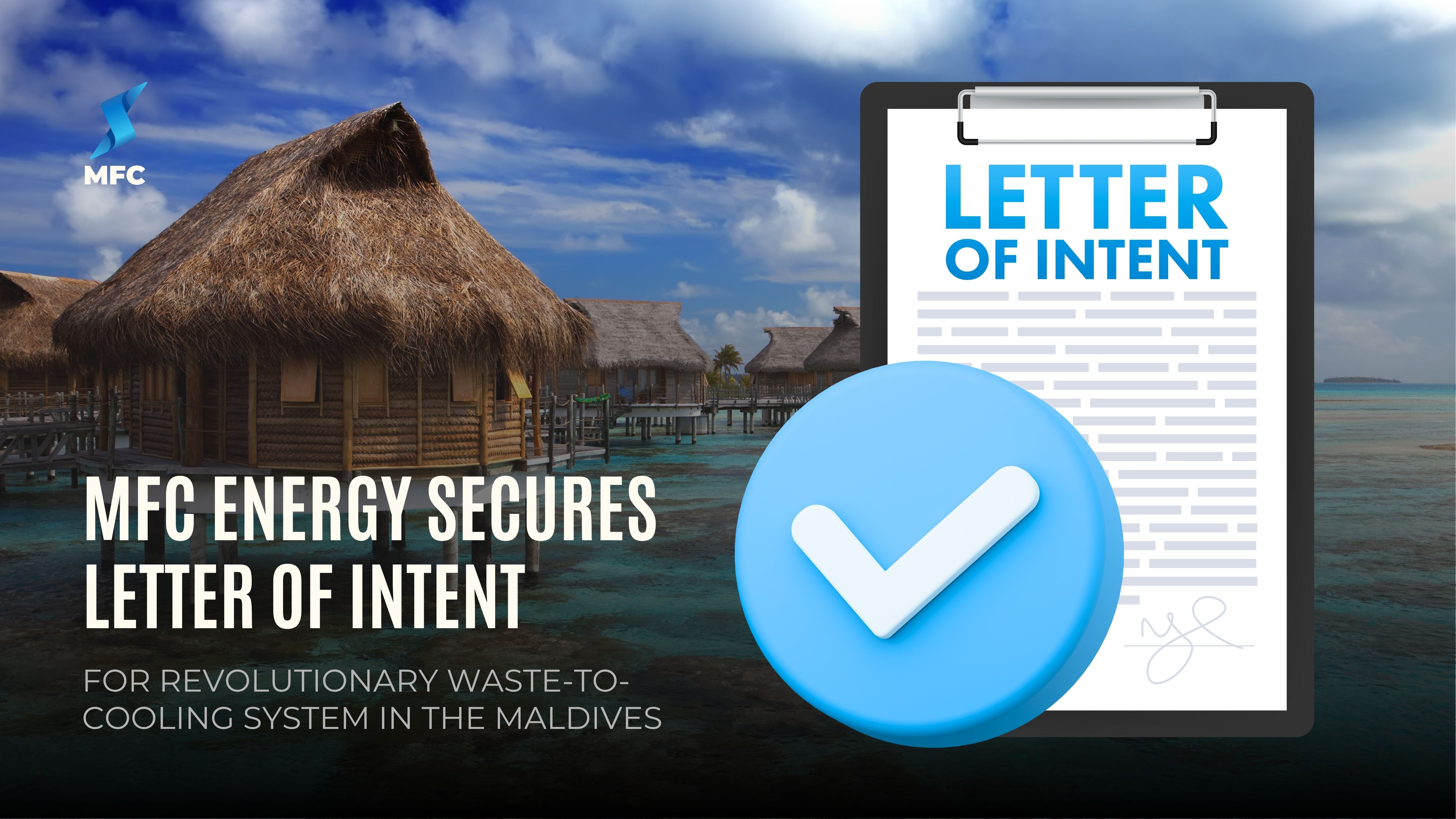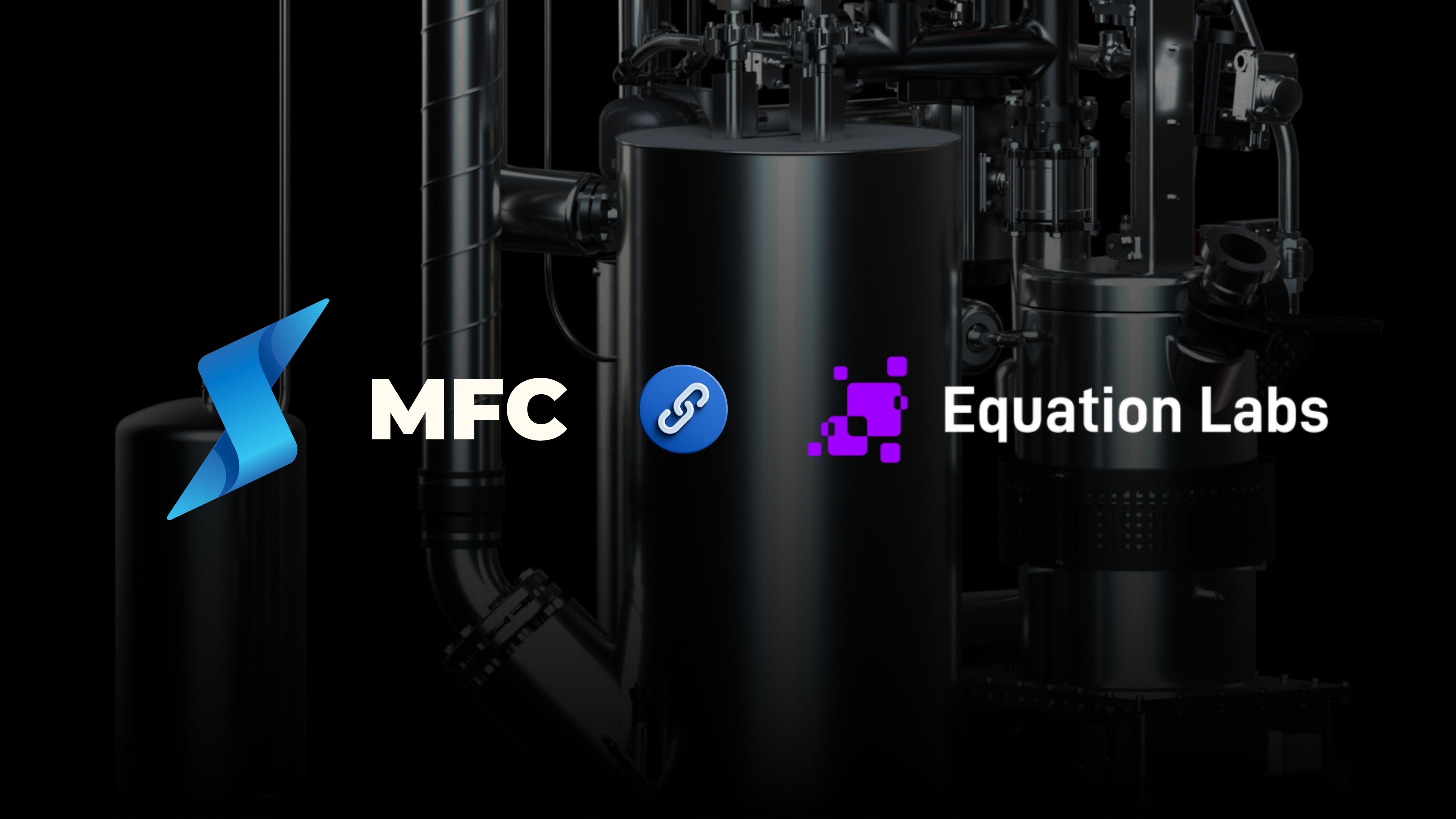Pioneering X-150 Technology Set to Transform Island Nation's Waste Management and Energy Infrastructure
The pristine waters and coral atolls of the Maldives have long captivated travelers from around the world, but beneath this tropical paradise lies a growing environmental challenge that threatens the very essence of what makes these islands so special. With limited land area and an increasing population driven by tourism growth, waste management has become one of the most pressing issues facing this island nation. Today, MFC Energy is proud to announce a groundbreaking development that could revolutionize how the Maldives approaches both waste management and energy production.
We have secured a Letter of Intent (LOI) to deploy our innovative X-150 waste-to-gas reactor technology in the Maldives, marking a significant milestone in our mission to provide sustainable energy solutions for island communities worldwide. This project represents more than just a business opportunity; it embodies our commitment to addressing the unique environmental challenges faced by small island developing states while demonstrating the transformative potential of advanced waste-to-energy technology.
The Maldivian Challenge: Where Paradise Meets Practicality
The Republic of Maldives, consisting of 1,192 coral islands grouped into 26 atolls, faces environmental challenges that are both unique and urgent. With a total land area of just 298 square kilometers and a population of approximately 540,000 people, the nation grapples with severe space constraints that make traditional waste management approaches virtually impossible. The situation is further complicated by the country's heavy reliance on tourism, which generates substantial additional waste while simultaneously requiring the pristine environment that attracts visitors in the first place.
Currently, the Maldives imports nearly all of its energy requirements, primarily in the form of diesel fuel, making it one of the most carbon-intensive energy systems in the world on a per-capita basis. The country's energy costs are among the highest globally, with electricity prices that can exceed $0.30 per kilowatt-hour in some areas. This economic burden, combined with the environmental impact of fossil fuel dependence, has created an urgent need for innovative solutions that can address multiple challenges simultaneously.
The waste management situation is equally challenging. Most inhabited islands lack adequate waste processing facilities, leading to practices such as open burning and ocean dumping that threaten both human health and marine ecosystems. The country's famous coral reefs, which form the foundation of its tourism industry and provide critical coastal protection, are increasingly threatened by pollution and climate change. Traditional waste-to-energy solutions have proven inadequate for the Maldivian context due to their large scale requirements, high capital costs, and the logistical challenges of operating complex systems across hundreds of remote islands.

Introducing the X-150: Revolutionary Waste-to-Gas Technology
At the heart of our Maldivian initiative lies the X-150 waste-to-gas reactor, a breakthrough technology that represents years of research and development in advanced thermal processing. Unlike conventional waste-to-energy systems that rely on direct combustion, the X-150 employs a sophisticated gasification process that converts organic waste materials into clean-burning synthetic gas, or syngas, which can then be used for electricity generation, heating, or cooling applications.
The gasification process occurs in a controlled, oxygen-limited environment at temperatures ranging from 700 to 1000 degrees Celsius. This precise temperature control is crucial for optimizing the conversion efficiency while minimizing the production of harmful byproducts. The organic components of waste materials undergo thermal decomposition, breaking down complex molecules into simpler compounds that form the basis of the synthetic gas. This process is fundamentally different from incineration, as it produces significantly fewer emissions and generates a much cleaner energy output.
What makes the X-150 particularly revolutionary is its modular design and compact footprint. Traditional waste-to-energy facilities often require massive infrastructure investments and are designed to process hundreds of tons of waste per day, making them unsuitable for smaller communities or island environments. The X-150, by contrast, is designed to efficiently process between 10 to 50 tons of waste per day, making it perfectly suited for the scale of individual islands or resort complexes in the Maldives.
The technology incorporates advanced control systems that continuously monitor and adjust operating parameters to ensure optimal performance. Sophisticated sensors track temperature, pressure, gas composition, and other critical variables, while automated systems make real-time adjustments to maintain peak efficiency. This level of automation is essential for deployment in remote locations where highly specialized technical expertise may not be readily available.
The BioCool Innovation: Turning Waste into Comfort
Perhaps the most exciting aspect of our Maldivian project is the integration of our proprietary BioCool technology, which transforms the X-150 from a simple waste-to-energy system into a comprehensive waste-to-cooling solution. In tropical climates like the Maldives, cooling represents one of the largest energy demands, often accounting for 60-70% of total electricity consumption in hotels, resorts, and residential buildings.
The BioCool system works by utilizing the thermal energy produced during the gasification process to drive absorption cooling cycles. This thermally-driven cooling technology has been around for decades but has rarely been integrated with waste processing systems in such an elegant and efficient manner. The process begins with the high-temperature thermal energy generated by the X-150 reactor, which is captured and directed to specialized absorption chillers.
These absorption chillers use a combination of water, lithium bromide, and ammonia to create cooling effects without the need for electricity-intensive compressors found in traditional air conditioning systems. The process is remarkably efficient, as it essentially converts waste heat into useful cooling, creating a closed-loop system that maximizes energy utilization. For every ton of waste processed, the integrated X-150-BioCool system can generate both electricity and cooling capacity equivalent to several tons of traditional air conditioning.
The environmental benefits of this approach are substantial. By reducing the electricity demand for cooling, the system decreases the overall carbon footprint of buildings and facilities. In the Maldivian context, where electricity is primarily generated from imported diesel fuel, this reduction in cooling-related electricity consumption translates directly into reduced fossil fuel imports and lower greenhouse gas emissions.
Strategic Partnership and Implementation Framework
The Letter of Intent for the Maldivian project represents the culmination of extensive discussions with local government officials, environmental agencies, and private sector partners who recognize the transformative potential of our technology. The project will be implemented in phases, beginning with a pilot installation on a selected island that will serve as a demonstration site for the broader deployment strategy.
The initial phase will focus on a resort or inhabited island with a population of 2,000 to 5,000 people, providing an ideal testing ground for the technology while generating immediate environmental and economic benefits. This pilot installation will process approximately 15-20 tons of waste per day while providing both electricity and cooling for the local community or resort facilities.
One of the key advantages of our approach is its scalability and adaptability to different island contexts. The modular design of the X-150 system allows for customization based on specific waste generation patterns, energy demands, and local conditions. For smaller islands with limited waste generation, multiple X-150 units can be networked together to create a distributed energy system that serves multiple communities. For larger islands or resort complexes, the system can be scaled up to handle greater waste volumes while providing proportionally more energy output.
The project also incorporates comprehensive training and technology transfer components to ensure long-term sustainability and local capacity building. Our team will work closely with Maldivian engineers and technicians to provide the knowledge and skills necessary for ongoing operation and maintenance of the systems. This approach not only ensures the technical success of the project but also contributes to the development of local expertise in advanced energy technologies.

Environmental Impact and Sustainability Benefits
The environmental implications of deploying X-150 technology in the Maldives extend far beyond simple waste processing and energy generation. The project addresses multiple environmental challenges simultaneously, creating synergistic benefits that amplify the overall positive impact.
From a waste management perspective, the X-150 system will dramatically reduce the volume of waste requiring disposal while eliminating the harmful practices of open burning and ocean dumping that currently threaten marine ecosystems. The gasification process reduces waste volume by approximately 85-90%, with the remaining material consisting primarily of inert ash that can be safely disposed of or even used as construction material.
The reduction in fossil fuel imports represents another significant environmental benefit. Each X-150 installation can displace thousands of liters of diesel fuel annually, reducing both the carbon footprint and the environmental risks associated with fuel transportation and storage in sensitive marine environments. The cumulative effect of multiple installations across the Maldivian archipelago could substantially reduce the country's dependence on imported fossil fuels.
Perhaps most importantly, the project contributes to the Maldives' broader climate resilience and adaptation strategies. As a low-lying island nation, the Maldives is particularly vulnerable to the impacts of climate change, including sea-level rise, increased storm intensity, and coral bleaching events. By reducing greenhouse gas emissions and demonstrating viable pathways for sustainable development, the X-150 project supports the country's efforts to build climate resilience while maintaining economic growth.
The technology also addresses the critical issue of marine pollution, which threatens the coral reef ecosystems that are essential for both tourism and coastal protection. By providing an alternative to ocean dumping and reducing the overall waste burden on island communities, the X-150 system helps protect the marine environment that forms the foundation of the Maldivian economy and way of life.
Economic Opportunities and Market Potential
Beyond its environmental benefits, the Maldivian project represents significant economic opportunities for both MFC Energy and the local economy. The deployment of X-150 technology creates new revenue streams while reducing operational costs for waste management and energy procurement.
For resort operators, the economic benefits are particularly compelling. The integrated waste-to-cooling system can reduce energy costs by 40-60% while eliminating waste disposal fees and transportation costs. In the Maldivian context, where waste often must be transported to centralized facilities on other islands, these savings can be substantial. The system also provides greater energy security and independence, reducing vulnerability to fuel price fluctuations and supply disruptions.
The project creates opportunities for local employment and skills development, from construction and installation to ongoing operation and maintenance. The technology transfer components ensure that these benefits extend beyond the initial deployment phase, creating lasting capacity within the local workforce.
From a broader market perspective, the Maldivian project serves as a crucial proof-of-concept for similar deployments across the Indian Ocean region and other small island developing states worldwide. Success in the Maldives will demonstrate the viability of the technology in challenging tropical marine environments, opening doors to markets in the Caribbean, Pacific, and other island regions facing similar challenges.
The project also positions MFC Energy at the forefront of the growing market for distributed energy solutions in developing countries. As governments and private sector actors increasingly recognize the limitations of centralized energy systems in remote or island environments, demand for modular, scalable technologies like the X-150 is expected to grow substantially.
Looking Forward: A Model for Sustainable Island Development
The Letter of Intent for the Maldivian project represents more than just a business milestone; it embodies our vision for a future where advanced technology enables sustainable development in even the most challenging environments. The project will serve as a living laboratory for sustainable island development, demonstrating how innovative waste-to-energy solutions can address multiple environmental and economic challenges simultaneously.
As we move forward with the implementation planning and detailed engineering phases, we remain committed to ensuring that the project delivers maximum benefits for the Maldivian people and environment. Our approach emphasizes collaboration, transparency, and long-term sustainability, recognizing that true success requires not just technical excellence but also social acceptance and environmental stewardship.
The lessons learned from this project will inform future deployments across the region and beyond, contributing to the global effort to develop sustainable energy solutions for small island developing states. We believe that the X-150 technology, combined with our BioCool innovation, represents a paradigm shift in how we think about waste management and energy production in island environments.
The Maldivian project is just the beginning of what we envision as a global transformation in sustainable energy technology. As we continue to refine and improve our systems based on real-world deployment experience, we look forward to bringing these benefits to communities around the world that face similar challenges.
Through innovation, collaboration, and unwavering commitment to sustainability, MFC Energy is proud to play a role in creating a cleaner, more sustainable future for island communities worldwide. The Maldives project represents a crucial step toward that future, and we are excited to share this journey with our partners, stakeholders, and the global community committed to environmental stewardship and sustainable development.
For more information about MFC Energy's X-150 technology and our sustainable energy solutions, visit our website or contact our team directly. We welcome opportunities to discuss how our technology can address the unique energy and environmental challenges facing your community or organization.









